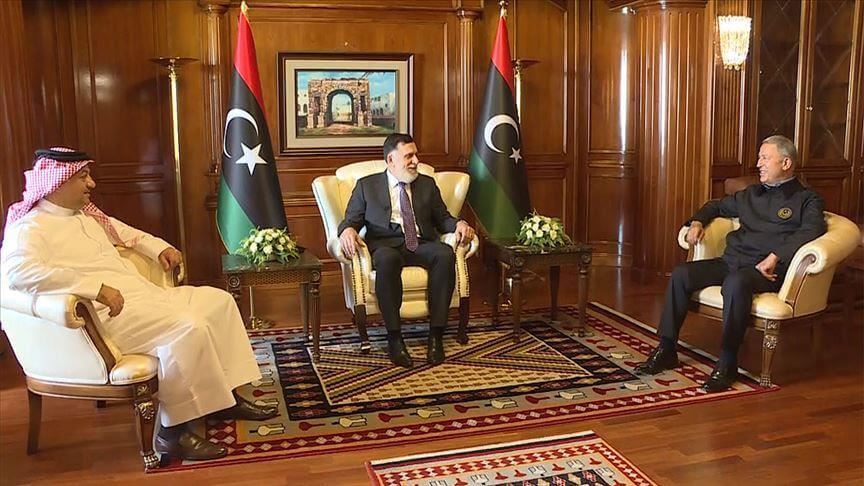On Monday, Qatar’s Defence Minister Khalid bin Mohammad Al-Attiyah arrived at the Libyan capital for talks with officials from the United Nations-backed Government of National Accord (GNA). Al-Attiyah’s trip coincided with visits by German Foreign Minister Heiko Maas and Turkey’s Defence Minister Hulusi Akar to Tripoli.
Regional allies Turkey and Qatar reiterated their support for the GNA, whom Ankara has been militarily supporting in its long-standing conflict with the Libyan National Army (LNA), a rival force led by renegade General Khalifa Haftar in the east. Akar and Turkish Chief of Staff General Yasar Guler were visiting the capital to “observe the operations” being carried out under the military cooperation agreement signed in late 2019 which includes cooperation for training and consultation from the Turkish Armed Forces to the GNA. “We believe that we will achieve the wanted results by supporting our Libyan brothers in their just cause,” Akar said.
While Ankara and Doha back the GNA, the LNA is supported by the United Arab Emirates (UAE), Russia, and Egypt. On Monday, leaders Turkish President Recep Tayyip Erdogan and Russian leader Vladimir Putin reportedly spoke on the phone to stress the importance of dialogue and close cooperation in Libya. Further, it was also reported that the GNA agreed to a tripartite military cooperation deal with Turkey and Qatar. This development comes at a time when the Libyan government and the LNA have positioned themselves in a stalemate around the strategically important town of Sirte.
Berlin, which has been a crucial mediator to the conflict, has backed calls to establish a demilitarized area around Sirte, which falls around 450 km east of the capital. So far, Germany’s position in the conflict has mainly been focused on removing foreign actors from the war. During his visit, which did not include meeting the Turkish and Qatari officials, Maas urged Libyan actors to end the “very dangerous situation” and follow a UN proposal to create the demilitarized zone. “We see a deceptive calm in Libya right now. Both sides and their international allies are continuing to arm the country on a massive scale and are sticking to preconditions for a ceasefire,” said Maas.
There have already been several failed attempts at a ceasefire and political deals in Libya, including the international conference held in Berlin to mediate a political deal and secure a ceasefire in January. Haftar’s forces have also imposed an oil blockade, which has cost the war-torn country billions in revenue. Maas reiterated the need to immediately halt escalations around Sirte, as well as the importance of lifting the oil blockade and entering direct talks with the two parties. The United States has also supported this position.
On the other hand, Libyan Foreign Minister Mohamed Taher Siala has said that his administration “does not need more initiatives” to mediate the conflict but rather the introduction of a constitution that can establish the base for democratic elections. Siala further added that the GNA strongly rejects the European Union’s Operation Irini mission, which is aimed at the enforcement of a 2011 UN arms embargo in the country. He stressed that Irini “does not monitor the transfer of weapons and mercenaries to the aggressor”.
Later in the day, Maas reportedly travelled to Abu Dhabi to urge the emerging regional leader to use its influence with the LNA and help create conditions for a ceasefire “in line with the Berlin summit”.
See also: Turkey Slams German Role in EU-Led Libya Arms Blockade

